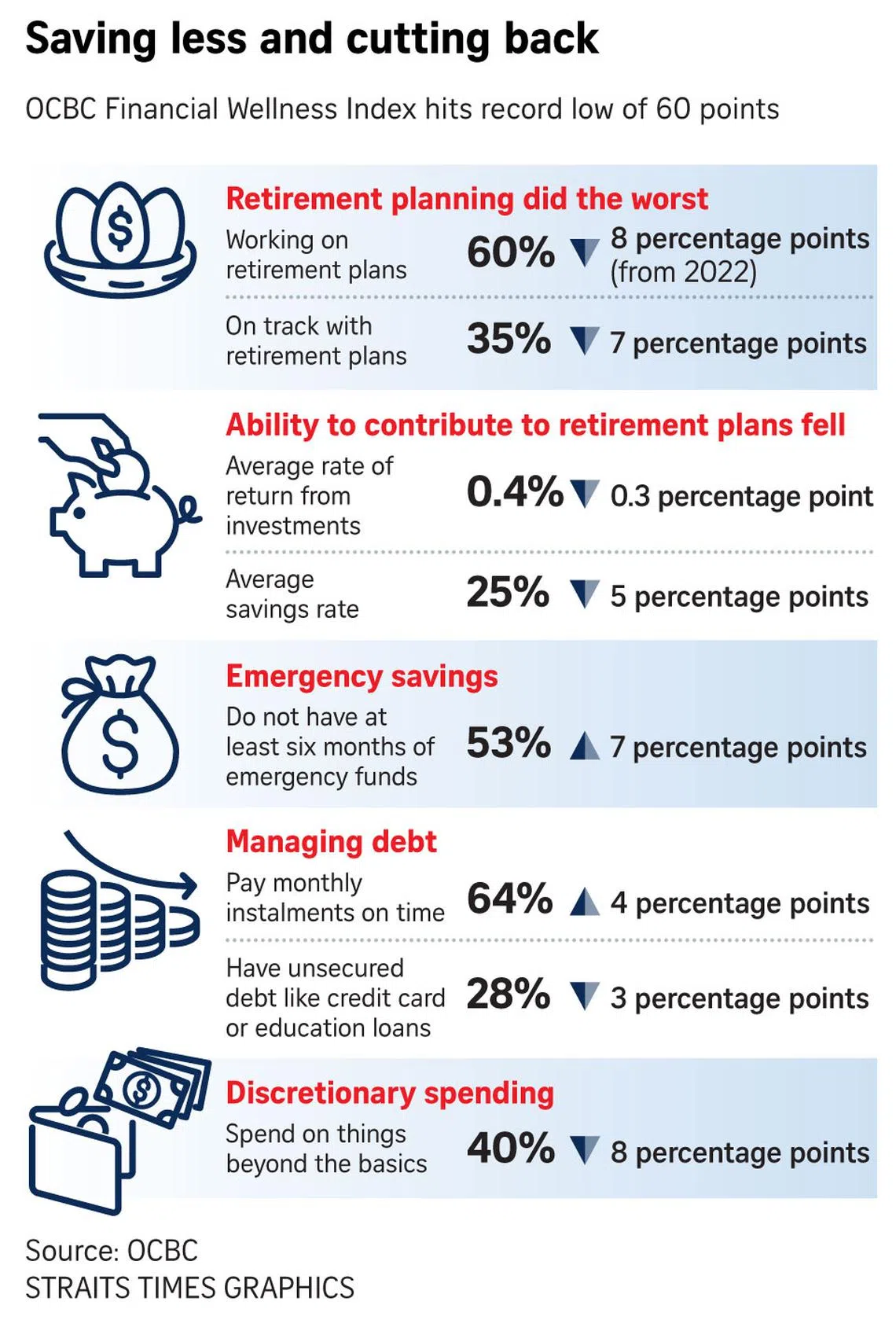More people are saving less amid rising costs: OCBC financial wellness index
Sign up now: Get ST's newsletters delivered to your inbox

This year’s study found that retirement planning performed the worst.
PHOTO: ST FILE
Follow topic:
SINGAPORE – Retirement planning has taken a back seat as inflation makes things more expensive and working adults prioritise debt repayments amid high interest rates, a new study noted on Wednesday.
OCBC uses the study to compile a Financial Wellness Index, which has fallen for the second straight year, and now sits at 60, the lowest score since its inception in 2019.
Survey respondents said rising inflation, high interest rates and growing fears of an economic slowdown have made them more cautious with spending and taking on debt.
OCBC polled 2,000 working adults – Singapore citizens and permanent residents – aged between 21 and 65 in August.
Respondents were assessed on 10 pillars of financial wellness, including saving habits, whether they spent beyond their means, if they have protection from financial emergencies, plans for retirement and if they speculated for quick gains.
This year’s study found that retirement planning performed the worst.
OCBC said lifestyle aspirations in retirement have not changed but the ability to fund and enjoy that lifestyle has dropped.
Only 60 per cent of respondents said they are working on retirement plans, down 8 percentage points from 2022. Fewer of those with retirement plans say they are on track with their targets, while those who have not started planning at all said they will push back starting to a later age.
This was a common observation across all age groups, with respondents in their 20s postponing retirement planning the longest – to 42 years old on average, eight years later than what was said in 2022.
Respondents in their 50s intend to start planning only when they are 60, two years later than what this group said in 2022.
OCBC noted that the ability to contribute to retirement plans has dropped across the board as investment returns fell in 2023 and people managed to save less of their income. The average rate of return from investments dropped to 0.4 per cent, from 0.7 per cent in 2022, while people are now saving 25 per cent of their monthly income, down five percentage points from 2022.
It is not only retirement savings that are causing problems; people are also struggling to build up “rainy day” funds for emergencies such as major medical expenses or meeting their family’s financial needs for the next year.
Financial experts recommend at least six months of monthly salary as a rainy day fund. The study found that 53 per cent did not have sufficient emergency funds, compared with 46 per cent in 2022.

Respondents are focusing on managing and repaying their debts amid high interest rates, so they are saving less and postponing retirement planning: 64 per cent reported paying off their monthly mortgage instalments on time, compared with 60 per cent in 2022. People are also reducing discretionary spending: 40 per cent said they can spend on things beyond the basics, a drop of 8 percentage points from last year.
OCBC group wealth management head Tan Siew Lee said that while people are saving less and postponing retirement, they continue to have good financial habits.
She said people are managing their debts better this year and continue to save regularly, albeit smaller amounts, noting: “It is not about how much you save. It is the act of having the habit of saving regularly.”
For now, other more urgent priorities may take precedence and people save less, but “when things turn better, you can go back to saving what you used to save”, she added.


